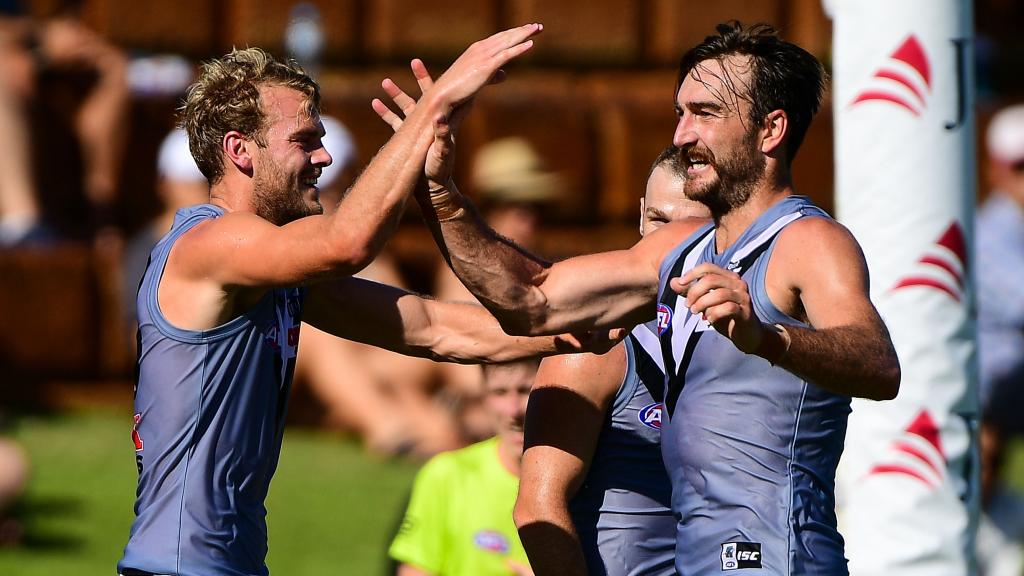Melbourne and St Kilda were both driven this pre-season by heartbreaking and disappointing ends to 2017. Compared throughout their rebuilding years, they asked questions of themselves and both now believe they can make the jump to contenders. Nathan Schmook goes inside two of the rising clubs of 2018.
YOU DON'T have to go looking for adversity in the AFL, Melbourne coach Simon Goodwin says. It generally finds you.
It found the Demons coach at the end of his first season in charge, as he watched helplessly as West Coast beat Adelaide in the final home and away game of the year to knock his team out of the top eight by 0.5 per cent.
And it found him again three months later when his players, on the back of an AFL Players Association delegates camp, raised health and safety concerns about a pre-Christmas SAS-style boot camp, prompting it to be cancelled.
But there is much more to Melbourne's story this year than a bungled end to 2017 and a camp that never was.
As charged as those two moments were, what has happened in response is what will drive one of this year's rising teams.
That final day of the home and away season last August is where preparation for 2018 started for Goodwin and his key football lieutenants.
Football manager Josh Mahoney, then list manager Todd Viney and performance manager Brendan McCartney joined the coach at his home for a barbecue with their families before the Eagles hosted the Crows.
The Demons, whose fate was out of their hands after a loss to Collingwood the previous day, had prepared for both scenarios, mapping out a plan for the next two weeks if the Crows won and kept the Dees in the eight.
But Mahoney was also ready for the worst-case scenario, and the email alerting players that exit meetings would start on Monday went out soon after the Eagles' 29-point win.
Everything Melbourne has done since that day can be linked in some way back to the miniscule margin that separated it from the Eagles in the closest ever finish to an AFL finals race.
"It allowed us to have a real pointed approach in that we never wanted to feel that again," Mahoney told AFL.com.au.
"We didn't want to feel that we'd got so close but didn't get there.
"So what you take away is that it's not the 'one percenters', it's the '0.001 per centers'."
Dejected Melbourne players leave the field after losing to Collingwood in round 23, 2017. Picture: AFL Photos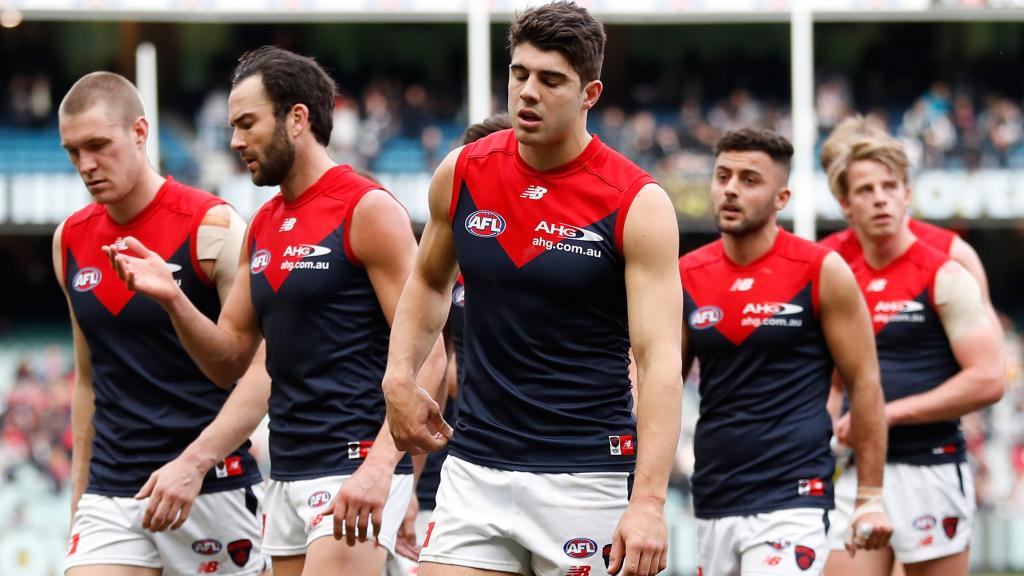
***
If the final weekend of last year's home and away season has been driving Melbourne, St Kilda's moment of pain – and subsequent inspiration – came four weeks earlier.
The Saints went to Adelaide to take on Port in round 19 without decorated veterans Nick Riewoldt and Leigh Montagna, with speculation swirling about the pair's future. For the young Saints who lined up in that match, it was a significant opportunity.
In the rooms of Adelaide Oval, where the Saints had never won, captain Jarryn Geary and young leader Seb Ross drove the message pre-game that this was the team of the future.
Midfielder Luke Dunstan, a pivotal figure at the Saints who brings players together socially, was also vocal about the opportunity ahead.
The young Saints delivered for much of the match, particularly Dunstan, but it will be remembered for Paddy Ryder's tap and Robbie Gray's running goal in the final 10 seconds.
What an incredible finish! #AFLPowerSaints pic.twitter.com/zdxsik6n4Y
— AFL (@AFL) July 29, 2017
It was a moment that burned for the Saints. After the match, and with a mix of frustration and pride in his players' fight, coach Alan Richardson delivered a calm address.
The bus ride afterwards was silent. As one player told AFL.com.au: "We all spoke about this being the team of the future, and we probably felt like we'd won the game. For something like that to happen, it really hurt us".
Like Melbourne, which was driven to take its football department apart over two weeks and look for any improvement possible, the Saints have made 'save the game' scenarios a big part of their pre-season.
They had felt prepared for Ryder-Gray scenarios in 2017, but they are undoubtedly better prepared now.
Heartbroken Saints watch on as Port Adelaide players celebrate. Picture: AFL Photos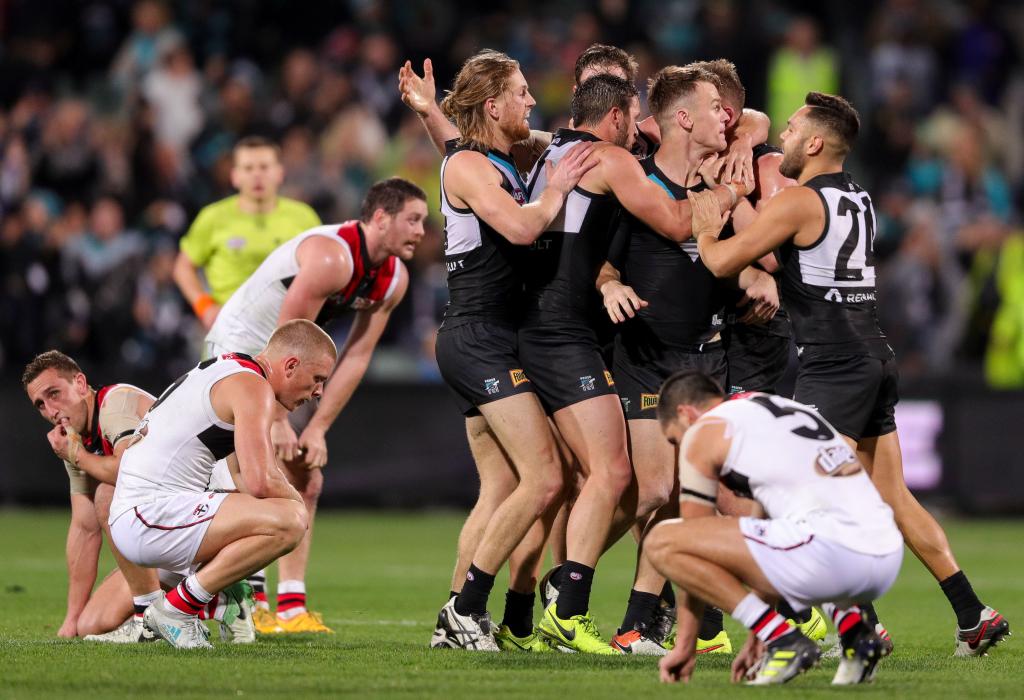
***
Speaking at Melbourne's home away from home at Casey Fields in Melbourne's outer south-east, Mahoney says he became frustrated over the summer when speaking with fans who wanted to let him know how disappointed they were to miss the finals.
Knowing how driven the club's players and coaches had been on the back of missing September, the football manager had come around to the view that "maybe in the long run it's the best thing for us".
"(If we'd played finals), maybe the players would have left thinking that was a good improvement again and felt good," Mahoney said.
"But the way it finished, everyone had a little sting in their tail."
The changes made on the back of last year's finish include a new football department layout that has replaced offices with more casual breakout areas, and the addition of a mental health expert to work with the coaches on how they communicate with their players.
Paying more attention to the players' mental health is an area in which the Demons believe they can gain a competitive advantage.
Goodwin is passionate and educated about mental health and the brain, and a trip to Red Bull's extreme sports base in Los Angeles late last year taught him more about how athletes recover above the shoulders.
"Working with the brain is something that really interests me and they've got some athletes who do some pretty extreme stuff. There's pressure associated with that," the coach said.
"I learned a lot through Red Bull and will apply some of that through the season."
Goodwin and the Demons talk about the 'Melbourne person' – a footballer, coach or staff member who is hard-working, competitive, resilient and humble.
Simon Goodwin calling the shots at training: AFL Photos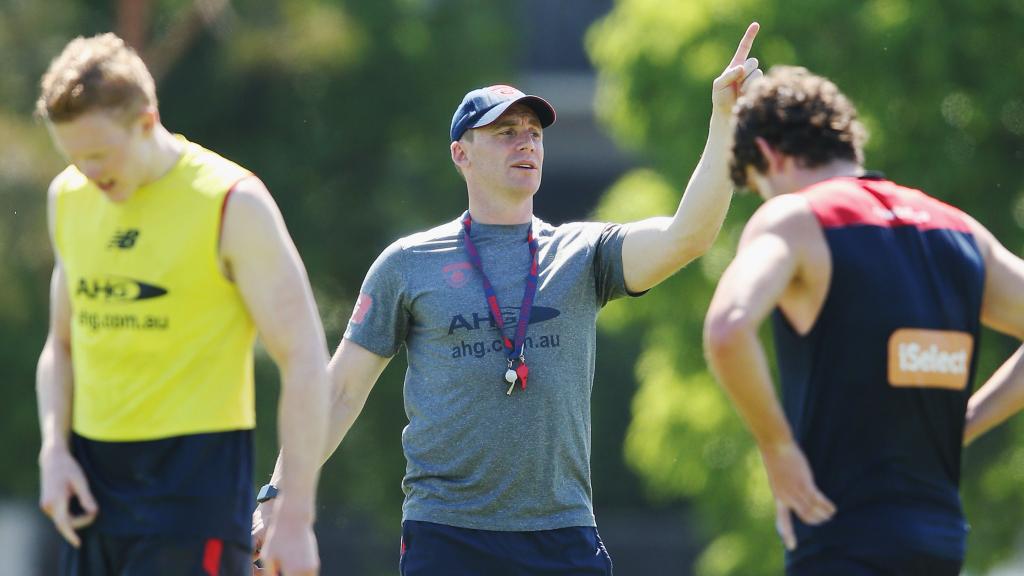
The coach won't expand on the activities the Demons undertake to build these traits in their players, but becoming more vulnerable to each other and gaining a deeper understanding of each other – as Richmond did in 2017 through its programs – has been key.
"We like to keep those things internal … we want to foster that safe environment where people can grow," Goodwin said.
"We link all our programs into developing the Melbourne person, and we remind ourselves of that all the time."
Being humble is an important trait to Goodwin, and it is understood he asked questions of his players when a report last year suggested the Demons had sledged St Kilda about not qualifying to play finals.
He was content to take his players' word that no such verbal jousting had taken place.
***
While Goodwin has had one full season to mould his team – as well as 2015 and 2016 as coach-in-waiting to Paul Roos – Richardson has been shaping his players since the end of 2013.
Those who work closely with him have no doubt the Saints are becoming a team in the coach's mould, playing like he did in 114 games for Collingwood – honest and hard at the ball, and always following the coach's instructions and helping each other.
"That's how he develops his players and that's how we're seeing our players play," one of his lieutenants said.
Richardson is known among the coaching fraternity as one of the industry's good guys. He's easy to work with and knows when to have a laugh and when to be serious. He's generous to his players, too, recently handing housemates Acres and Dunstan the keys to his boat.
But most importantly he empowers his people. An example of this pre-season was the potentially significant change to move Adam Kingsley into a new 'transition' coach role, looking after both offensive and defensive movement.
Kingsley, who some veteran Saints believe to be one of the smartest coaches they've played under, will be working closely with opposition analyst Robbie Chancellor to forecast trends within games and across the season to try and stay ahead of the opposition.
One of Kingsley's key messages at St Kilda is around defence and the fact turnovers make up 60-65 per cent of score sources. It's the reason the Saints wanted a role in their coaching box linking defence with offence.
"Everyone watches stoppages and makes sure they're all over that, but it's only 30 per cent of the score," Kingsley said.
"So what are you doing for the other 70 per cent? That's something we can improve on."
Accuracy in front of goal is another area for improvement for the Saints, and future star Jack Billings was fanatical in his training standards over the summer, working with new goalkicking coach Ben Dixon.
"Same again, well done mate," Dixon assured him after repeatedly converting set shots on the track in February.
"It's not game day yet," Billings replied, moving to a deeper angle and continuing to practise his new technique, which he hopes will result in a better conversion than 2017's 23.36.
***
Like Goodwin, who also visited the NHL's New York Rangers in the off-season, Richardson is a passionate student, seeking opportunities to learn from coaches working in different codes.
He was approached in the off-season by successful NBL coach Dean Vickerman, who wanted to spend some time with the Saints, which Richardson welcomed.
He wasn't going to miss out on the opportunity, however, to see exactly what Vickerman was doing right at Melbourne United, who qualified for the NBL Grand Final.
He sat in on a team meeting in late January and then watched from the team bench as United beat the Cairns Taipans at Hisense Arena, taking particular note of the way Vickerman communicates with his players.
"When someone's having such a positive influence, you love to know if there's something in their coaching you can learn from," Richardson said.
Richardson also met with a former Collingwood teammate, Trent Hotton, who played 78 games for the Magpies and Carlton and now runs leadership programs, including Melbourne United's.
"They (United) really play for each other and it (leadership) is an area where there's been significant change at our footy club," Richardson said.
While Riewoldt and Montagna stepped out of their leadership roles for the 2017 season, their absence has been keenly felt this pre-season – but not in the negative way the club might have anticipated.
People at St Kilda are careful with their words when explaining the difference in 2018, because Riewoldt and Montagna were remarkable and loyal contributors.
But there is a sense that the retirement of the pair, known as the "elders" last year, has inspired important changes and young players are more relaxed and vocal in their absence.
At a leadership camp in the Northern Territory before the pre-season started, the coaches got out of the way and let the leadership group decide what they wanted to stand for.
It gave the players, including Ross, Dylan Roberton, Jack Steven and Jack Newnes, a sense that it was now their team to steer and they were the ones responsible for bringing the next generation through.
It also meant the group's standards were in place for what players have described as the most enjoyable pre-season of their careers as they prepare to move to a new training base at the club's spiritual home in Moorabbin.
Ben Long and Seb Ross in action at Saints training. Picture: AFL Photos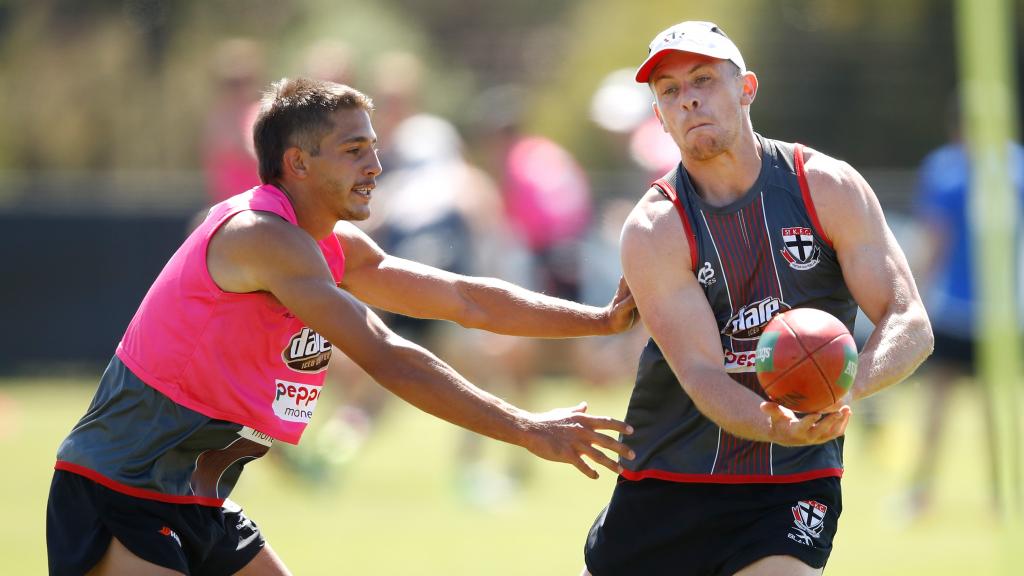
"It almost sounds disrespectful to talk about this, but the blokes are in as positive a frame of mind as I've seen them in my time at the footy club because the senior players have moved on," Richardson said.
"That's just reality. It happened at Collingwood when 'Bucks' (Nathan Buckley) retired, and all of a sudden (Scott) Pendlebury, (Dane) Swan and these guys sensed opportunities.
"We've got a sense of it across the group. That's the way the blokes have trained. It's really positive."
***
A highlight of pre-season training at Melbourne this summer was the slip of paper that recorded how many players were on the track. From the start of the post-Christmas block, it was never lower than 36.
It has meant key forward Jesse Hogan, ruckman Max Gawn and midfielder Angus Brayshaw – all influential and popular players in the group – have been lifting the spirits of their teammates just with their presence.
The Demons never used injuries as an excuse last season, but the football department reported internal figures at the end of the year that players missed 168 games through injury, including 70 for their top six players.
At least 20 of the club's best 22 should run out for the round one clash against Geelong, with co-captain Jack Viney (foot) the only player ruled out and Tom McDonald (toe) under a cloud.
One player who won't be there is Jack Watts. The former Demon's trade to Port Adelaide was a key moment in Melbourne's off-season after the club made a "business decision" to part ways with the 26-year-old former No.1 pick.
It was a decision that saw president Glen Bartlett receive calls and emails to "intervene" in the trade, while Mahoney was taken to task on radio at an emotional time for fans.
Those at the club have no regrets however, after parting with Watts for pick No.31 and paying part of his wage at the Power.
There is a sense from insiders that the Demons did not believe they would not make their way to a Grand Final with Watts on their list.
His consistency in the contested aspects of the game and work ethic were doubted by key people at the Demons, and his fluctuations were tolerable from a younger player but not one with 153 games of experience.
In a nutshell, according to one insider: "Young blokes come in looking for role models and Jack wasn't a good role model for our players".
The player the Demons took with pick No.31, Bayley Fritsch, has been a bolter this pre-season and looks likely to face the Cats in round one, while Watts has seemingly relished his newfound freedom at Port, without the weight of a club on his shoulders.
Jack Watts celebrates a goal with new Power teammate Charlie Dixon. Picture: AFL Photos
***
In what shapes as an incredibly tight season, the much-hyped Melbourne has been tipped as the rising team of 2018 while the blue-collar Saints will be fighting not to be left behind in the stampede.
The Demons beat the Saints in both meetings last season, but that ended a 10-year, 14-game losing run.
Five years after both finished in the bottom three for successive seasons in 2013-14, the experts are red hot on Melbourne breaking its 11-year finals drought, but are the Saints doomed to a seventh successive season out of September?
When the Saints' first-to-fourth-year players gathered in November for a pre-season camp in Yea in country Victoria, they sat around a fire and talked to each other about not waiting. "If you're good enough, you're old enough," they said.
"We want things to happen quickly," Richardson said.
"And certainly our fans want things to happen quickly. We respect, understand and want that.
"We want to be a contender … (and) challenging this year. Absolutely."
For the Demons, the cultural shift that started in 2013 appears to be complete and they are ready for success.
President Bartlett, a hands-off leader who likes to keep the "stupid gas" of team selection out of the board room, can see the hard edge and "mongrel" he knew the Demons needed when he arrived five years ago.
The 53-year-old, who regularly catches up with Goodwin for a steak and a chat about the club's progress, was briefly shaken by the end to 2017, but read Jim Collins' best-selling business book Good to Great – recommended by a former coach in Perth – and had his faith in the Demons' path restored.
Goodwin appears as assured as anyone at the club. He has driven the core value of 'team first' at the Demons, and the 'Melbourne person' programs, knowing that nothing can be achieved with selfish people.
He "set a charter" for the Demons with his best and fairest address, which he ran past Mahoney, calling for the club to "lose sight of the shore" and develop a mindset that "every day matters".
There's no doubt the Demons have the talent, but culture will remain the question mark until success is delivered. It will be Goodwin's legacy.
"Culture is something that doesn't grow overnight. Culture will be the last thing people actually give any recognition to," the coach said.


